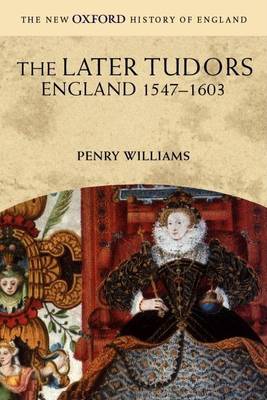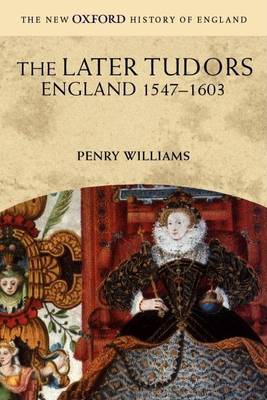
Door een staking bij bpost kan je online bestelling op dit moment iets langer onderweg zijn dan voorzien. Dringend iets nodig? Onze winkels ontvangen jou met open armen!
- Afhalen na 1 uur in een winkel met voorraad
- Gratis thuislevering in België vanaf € 30
- Ruim aanbod met 7 miljoen producten
Door een staking bij bpost kan je online bestelling op dit moment iets langer onderweg zijn dan voorzien. Dringend iets nodig? Onze winkels ontvangen jou met open armen!
- Afhalen na 1 uur in een winkel met voorraad
- Gratis thuislevering in België vanaf € 30
- Ruim aanbod met 7 miljoen producten
Zoeken
Omschrijving
The Later Tudors, the second volume to be published in Oxford's authoritative series The New Oxford History of England, tells the story of England between the accession of Edward VI and the death of Elizabeth I. The second half of the sixteenth century was a period of intense conflict between the nations of Europe, and between competing Catholic and Protestant beliefs. These struggles produced acute anxiety in England, but the nation was saved from the disasters that befell her neighbors and, by the end of Elizabeth's reign, achieved a remarkable sense of political and religious identity.
In this masterly and comprehensive study, Penry Williams explains how this process came about. He begins by weaving together the political, religious, and economic history of the nation, setting out the workings and development of the English state. Later chapters establish the broader perspective, with a thorough analysis of English society, family relations, and culture, focusing on the ways in which art and literature were used to uphold--and sometimes to subvert--the social and political order. The final chapter looks to Europe and across the seas at England's part in the shaping of the New World.
In this masterly and comprehensive study, Penry Williams explains how this process came about. He begins by weaving together the political, religious, and economic history of the nation, setting out the workings and development of the English state. Later chapters establish the broader perspective, with a thorough analysis of English society, family relations, and culture, focusing on the ways in which art and literature were used to uphold--and sometimes to subvert--the social and political order. The final chapter looks to Europe and across the seas at England's part in the shaping of the New World.
Specificaties
Betrokkenen
- Auteur(s):
- Uitgeverij:
Inhoud
- Aantal bladzijden:
- 656
- Taal:
- Engels
- Reeks:
Eigenschappen
- Productcode (EAN):
- 9780192880444
- Verschijningsdatum:
- 21/05/1998
- Uitvoering:
- Paperback
- Formaat:
- Trade paperback (VS)
- Afmetingen:
- 218 mm x 174 mm
- Gewicht:
- 966 g

Alleen bij Standaard Boekhandel
+ 140 punten op je klantenkaart van Standaard Boekhandel
Beoordelingen
We publiceren alleen reviews die voldoen aan de voorwaarden voor reviews. Bekijk onze voorwaarden voor reviews.











